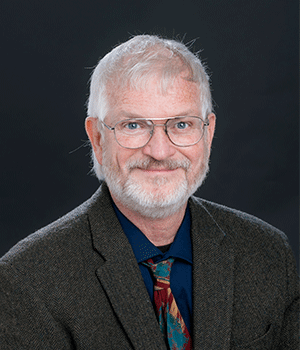
- bsra@uwm.edu
- 414-229-6916
- Engineering & Mathematical Sciences 990B
Brian Armstrong
- Professor, Mechanical Engineering
A graduate of both MIT and Stanford, Dr. Armstrong was attracted to UWM because of Milwaukee’s rich industrial history. His lifelong drive to implement technical research in pragmatic applications has led to advances in medicine (such as motion tracking to improve MRI imaging), robotics and Doppler radar. Dr. Armstrong enjoys getting students personally involved in projects and relies heavily on Socratic instruction methods.
Education
- PhD, Electrical Engineering/Robotics, Stanford University, 1988
- MS, Electrical Engineering, Stanford University, 1984
- BS, Physics, MIT, 1980
- BSc, Mechanical Engineering, MIT, 1980
Research Focus
- Image metrology and six degree of freedom spatial sensing from images.
- Medical imaging applications of spatial sensing from images.
- Human motion analysis applications of spatial sensing from images.
Publications
- Brian Armstrong, Jose A. Gutierrez, Bruce Wade, and Ralph Joseph. Stability of phase-based gain modulation with designer-chosen switch functions. International Journal of Robotics Research, 25(8):781–796, 2006.
- Brian Armstrong, Istvan Lauko, and Bruce Wade. Optimal NPID stabilization of Linear Systems Journal of Optimization Theory and Applications, 124(2):307-322, 2005.
- Luis R. Pereira, Brian S. R. Armstrong, and Carlos H. Rentel. Grenada. In "Proceedings, IEEE Radio and Wireless Symposium, Workshop on Wireless Networks in Harsh Environments Propagation and Coexistence". IEEE: Long Beach, CA, 2007.
- Brian S. R. Armstrong and Qinghui Yuan. Multi-level control of hydraulic gerotor motors and pumps. In Proc. 2006 American Control Conference, pages 4620–4627. IEEE: Minneapolis, 2006.
- Brian Armstrong. A single state elasto-plastic friction model. In Committee on Identification and Control of Complex systems (ICCoS) Seminar. Katholieke Universiteit Leuven: Leuven, Belgium, December 2003.
- ADHA:02 Brian Armstrong, Pierre Dupont, Vincent Hayward, and Friedhelm Altpeter. A single state elasto-plastic friction model. In Workshop on Friction: Modelling, Dynamics & Control. PATO Eindhoven University of Technology: Eindhoven, NL, February 2002.
- Brian Armstrong, Jose A. Gutierrez, Ralph Joseph, and Bruce Wade. The stability of nonlinear PID control with arbitrary partial-state knowledge. In Proc. 2002 Int. Conf. on Robotics and Automation. IEEE: Washington, 2002.
- Brian Armstrong, Thomas Verron, Lee Heppe, Jim Reynolds, and Karl Schmidt. RGR-3D: Simple, cheap detection of 6-DOF pose for tele-operation, and robot programming and calibration. In Proc. 2002 Int. Conf. on Robotics and Automation. IEEE: Washington, 2002.
- Pierre Dupont, Vincent Hayward, and Brian Armstrong. Single state elasto-plastic models for friction compensation. IEEE Trans. on Automatic Control. Under Review.
- Brian Armstrong and Ron Perez. A controls laboratory program with an accent on system identification. IEEE Control Systems Magazine, 21(1):14-20, February, 2001.
- B. Armstrong, D. Neevel, and T. Kusik. New results in NPID control: Tracking, integral control, friction compensation and experimental results. IEEE Trans. on Control Systems Technology, 9(1):399-406, 2001.
- Brian Armstrong and Bruce Wade. Nonlinear PID control with partial state knowledge: damping without derivatives. Inter. Journal of Robotics Research, 19(8):715-731, 2000. Invited Paper.
- Brian Armstrong and Brad S. Holeman. Target tracking with a network of Doppler radars. IEEE Trans. on Aerospace and Electronic Systems, 34(1):33-48, 1998.
- Brian Armstrong, Joseph McPherson, and Yonggang Li. Stability of Nonlinear PD control. Applied Mathematics and Computer Science, 7(2):101-20, 1997. Invited Paper.
- B. Armstrong and C. Canudas de Wit. CRC Controls Handbook, chapter Friction Compensation. Boca Raton: CRC Press, 1995. Invited Book Chapter.
Community Involvement
Member of Milwaukee Art Museum and Museum of Wisconsin Art